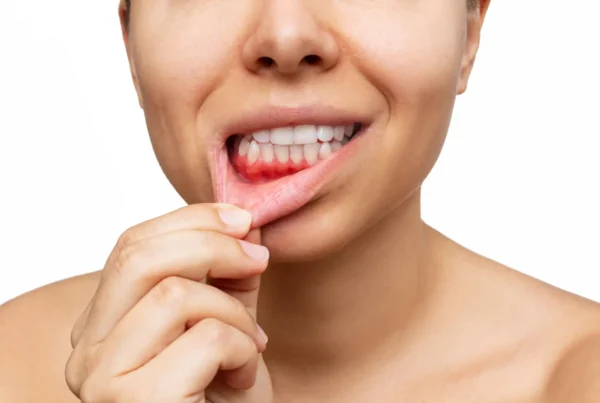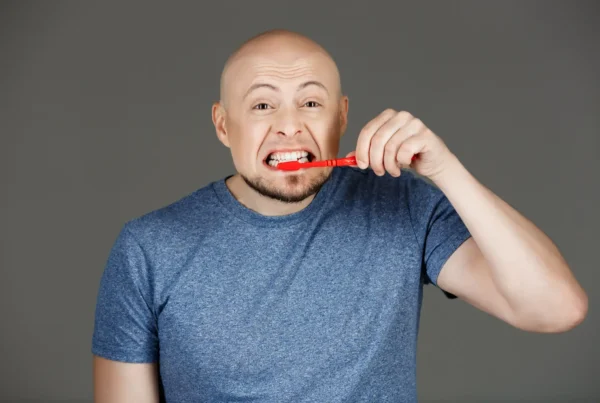- Oral health during pregnancy. Can pregnant women receive dental treatment under public health care?
- Dental treatment during pregnancy – yes or no?
- Is dental treatment safe during pregnancy?
- When is the best time for dental treatment during pregnancy?
- Dental treatment and the baby’s health
- Debunking myths about dental treatment during pregnancy
- Can you visit the dentist while pregnant? Summary
Pregnancy is a special period in a woman’s life when the health and well-being of the mother have a direct impact on the developing baby. For expectant mothers, proper oral hygiene is particularly important. Can dental treatment be done during pregnancy? Is it safe for the baby? This article will clear all doubts and debunk common myths related to dentistry during pregnancy.
Oral health during pregnancy. Can pregnant women receive dental treatment under public health care?
Pregnancy is a time of joy and anticipation, but also of changes that affect the entire body. Every pregnant woman should take extra care of her oral hygiene, as it plays a crucial role in her own health and the health of her baby. Unfortunately, many women avoid dentist visits due to fear or misconceptions. In reality, regular dental check-ups and treatments are essential for overall well-being during pregnancy.
The condition of the mouth can directly affect the course of pregnancy. Issues such as tooth decay or gum inflammation not only cause discomfort but may also lead to more serious consequences like premature birth or low birth weight. Doctors recommend that pregnant women do not skip dental visits and undergo treatment if necessary. Some treatments are even covered by public health insurance, reducing costs. When choosing a dental clinic, it’s important to inform the dentist about the pregnancy to receive appropriate care.
Dental treatment during pregnancy – yes or no?
There are many myths surrounding dental care during pregnancy that cause concern and hesitation. One common belief is that anesthesia or X-rays cannot be used as they may harm the baby. Others believe that no dental treatment should be performed during pregnancy at all. In reality, most of these concerns are unfounded. Neglecting treatment can do more harm than good.
Oral health affects the entire body. Regular dental visits during pregnancy are not just about maintaining a nice smile, but also about protecting the health of the baby and preventing serious complications. Seek reliable information and consult with specialists to address concerns.
READ MORE: Composite veneers for teeth
Is dental treatment safe during pregnancy?
Dental treatment during pregnancy is not only safe, but also strongly recommended to prevent complications. Problems like cavities, gum inflammation, or infections can lead to serious consequences if left untreated. Proper dental care improves the comfort and safety of the mother-to-be.
Safe procedures during pregnancy include cavity fillings, tartar removal, root canal treatment, and extractions if necessary. It is essential to inform the dentist about the pregnancy so they can adjust the procedure accordingly. Treatments such as teeth whitening should be postponed, as they are not essential and can wait until after delivery.
When is the best time for dental treatment during pregnancy?
Not all stages of pregnancy are equally suitable for dental procedures. Pregnancy is divided into three trimesters, each with different recommendations.
- The first trimester is a time of intense fetal development, so unnecessary procedures are avoided. Only emergency treatments are performed, such as for acute pain or infection that may pose a risk to the mother and baby.
- The second trimester is considered the safest time for dental treatment. The fetus is more stable, and the mother generally feels well. This is the best period for check-ups, cavity treatment, or tartar removal.
- The third trimester is a time to avoid long or complicated procedures. Treatment is only done if urgently needed to avoid stress and the risk of premature labor. Lying on the back for extended periods should also be avoided in this stage.
Dental treatment and the baby’s health
Dental care during pregnancy plays a key role not only in the mother’s health but also in the baby’s development. Oral issues such as cavities, gingivitis, or bacterial infections may lead to complications like premature birth, low birth weight, or even systemic infections in the mother. Bacteria from untreated oral inflammation can enter the bloodstream, causing inflammation that affects fetal development.
Pregnancy hormones can cause swelling, bleeding, and increased susceptibility to infections in the gums. This may lead to pregnancy gingivitis, which if untreated, can progress to periodontitis and increase the risk of complications. Nausea and vomiting can also increase the risk of tooth enamel erosion. Regular dental visits and treatment of oral problems are essential to protect both the mother and baby.
Dental care during pregnancy is safe when managed by an experienced dentist who chooses proper methods and medications. Modern local anesthesia is safe and helps avoid pain and stress, which could otherwise affect the baby. The second trimester is the best time to address dental issues without putting the fetus at risk.
Oral health during pregnancy also helps reduce the risk of transmitting cavity-causing bacteria from mother to child after birth. A healthy mouth ensures a smoother pregnancy and better conditions for fetal development. Dental treatment during pregnancy is not optional – it is a necessity for protecting both mother and child.
Debunking myths about dental treatment during pregnancy
Many myths still surround dental care during pregnancy, leading some women to avoid the dentist, which can negatively affect their health. Let’s debunk the most common myths.
- “It’s dangerous to treat teeth during pregnancy” – False. Properly chosen treatments are completely safe. Untreated oral conditions can lead to serious complications, including preterm labor and low birth weight.
- “Anesthesia can’t be used” – False. Modern local anesthetics are safe during pregnancy when selected by a professional. Avoiding pain and stress is more beneficial than skipping treatment.
- “X-rays are strictly forbidden” – False. Dental X-rays are not routine during pregnancy, but if needed, they can be performed safely using protective aprons. Modern equipment emits minimal radiation, making them safe in necessary cases.
- “Teeth cannot be extracted during pregnancy” – False. Tooth extractions are safe if needed, particularly in the second trimester. Delaying treatment can lead to worse complications.
- “Treatment should be postponed until after birth” – False. Postponing treatment is one of the biggest mistakes. Untreated conditions can worsen, leading to inflammation, abscesses, or tooth loss, as well as affecting pregnancy health.
- “Pregnancy automatically causes tooth decay” – False. Hormones can increase the risk of gum issues, but proper hygiene, a healthy diet, and regular check-ups prevent dental problems.
- “Fluoride toothpaste is unsafe during pregnancy” – False. Fluoride toothpaste is safe and recommended during pregnancy. It helps protect against cavities, which are more common in this period. The key is to avoid swallowing the paste and to follow dosage recommendations.
Can you visit the dentist while pregnant? Summary
Dental treatment during pregnancy is a key element in protecting the baby from complications. Ignoring oral problems can lead to premature birth, low birth weight, and other complications that could have been prevented through regular dental visits. Most dental procedures are completely safe during pregnancy, and timely treatment benefits both the mother and child. Health begins with a smile – let pregnancy be a beautiful testament to that. By taking care of your oral health, you are protecting yourself and your baby from unnecessary risks.






